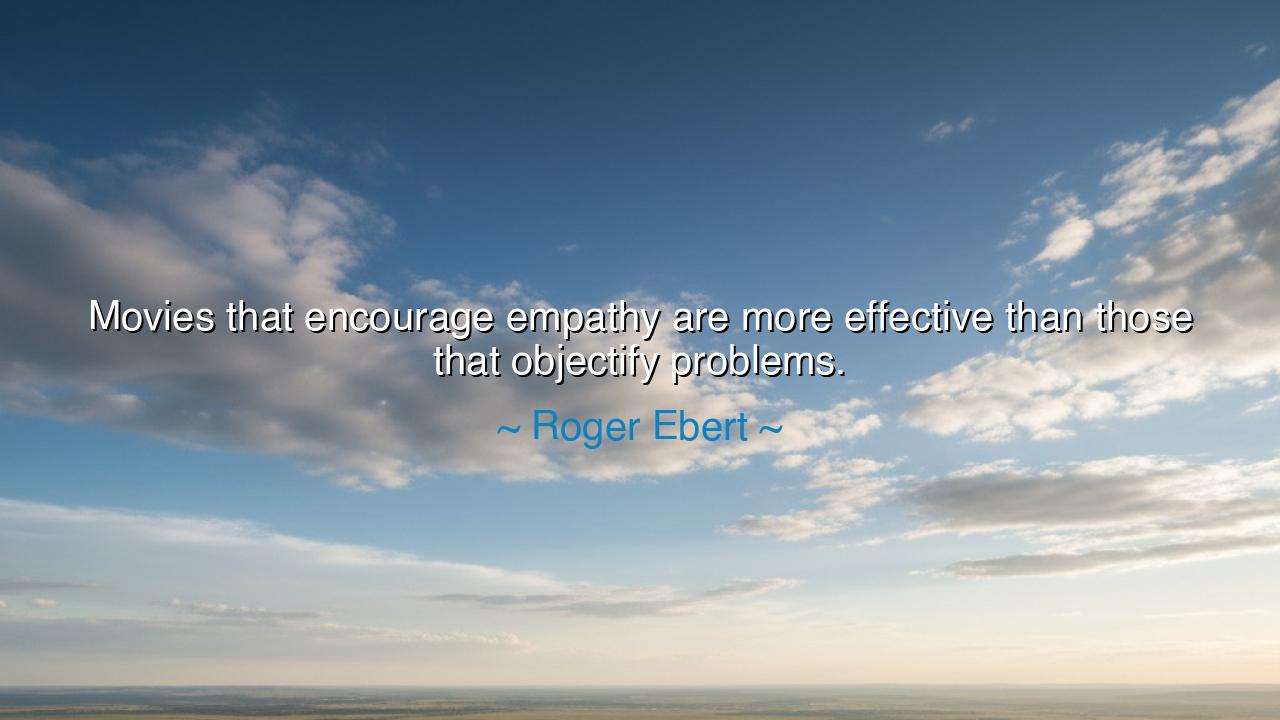
Movies that encourage empathy are more effective than those that






Hear, O seekers of truth and wisdom, the words of Roger Ebert, the sage of cinema, who declared: “Movies that encourage empathy are more effective than those that objectify problems.” In this saying lies not only the philosophy of art, but the philosophy of life itself. For the power of story is not in showing us the cold machinery of the world’s troubles, but in opening the door of the heart, so that we may walk in the shoes of another and feel their burdens as our own.
To objectify problems is to speak of them as distant things, as stones upon a chart, as numbers upon a page. We nod, we acknowledge, yet we remain unmoved, for the soul does not stir for abstractions. But to awaken empathy is to place flesh upon those numbers, to breathe life into those stones, to transform statistics into faces and cries. And once the heart has been touched, action follows where mere knowledge never could.
Consider the tale of Harriet Beecher Stowe, whose novel Uncle Tom’s Cabin gave voice to the enslaved in 19th-century America. There had long been debates, speeches, and writings about slavery, but they often objectified the issue, reducing it to laws and economics. Stowe, however, clothed the suffering in human form—families torn apart, mothers weeping, children running in chains. When readers wept with her characters, they could no longer ignore the reality. Abraham Lincoln himself is said to have greeted her as the woman who “started this great war.” Such is the power of empathy over objectification.
Ebert, who devoted his life to the study of film, knew that a movie is not merely an image on a screen, but a mirror to the soul. A documentary that only lists poverty may inform, but a film that lets us sit at the table of the hungry child and feel their longing will transform us. A drama that shows statistics of war may pass quickly from the mind, but one that allows us to hear the trembling voice of a soldier or the cries of a mother will lodge forever in the heart.
The meaning is profound: art must humanize suffering. For without humanization, there is no empathy; and without empathy, there is no change. The ancients understood this when Homer sang not of faceless armies, but of Achilles’ grief for Patroclus, of Hector’s farewell to his wife and child. By drawing us into the emotions of individuals, he made us feel the weight of war, not as a concept, but as a wound upon the heart of mankind.
What, then, is the lesson for you, O listener? In your own speech, in your own work, do not reduce the struggles of others to objects or problems to be managed. Instead, strive to see the human being within each circumstance. If you speak of poverty, remember the mother who counts coins by the fire. If you speak of injustice, remember the child whose dreams are cut short. Let empathy be the root of your understanding, for only empathy leads to compassion, and only compassion leads to action.
And finally, carry this practice into your daily life. When you hear of a problem, ask not only, “What is it?” but also, “Who suffers because of it?” When you tell stories, let them be stories that breathe, that laugh, that weep, that bleed. For the most effective voice is not the one that explains, but the one that makes another heart beat in rhythm with your own.
Thus the teaching of Roger Ebert endures: to awaken empathy is greater than to merely name problems. For empathy is the bridge from the mind to the heart, and from the heart to the hand that acts. Walk, then, as a weaver of empathy, in your words, your deeds, and your art—and you shall find that hearts once indifferent will rise in compassion, and through compassion, the world itself may change.






AAdministratorAdministrator
Welcome, honored guests. Please leave a comment, we will respond soon